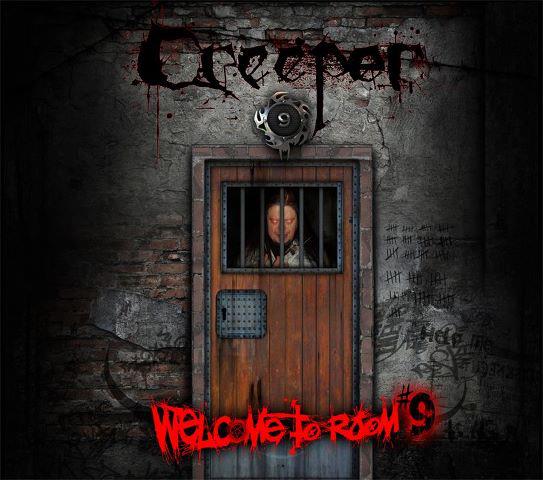
Album Review: Creeper - "Welcome to Room #9"
Now here’s an interesting emergence. Creeper, emerging from the greater Dallas market, is a metal act billing itself as traditional metal. Yet, this isn’t traditional metal as it has come to be defined in recent years through releases from bands like Grand Magus, all of which hail back to genesis acts like Judas Priest. Rather, this is a traditional metal schooled in thrash, death ad speed. It makes one wonder if the genre has evolved far enough, or merely aged enough, where movements once revolutionary are now predominately historical. If Metallica’s induction into the Rock and Roll Hall of Fame was not evidence enough, Creeper and their contemporaries may well be.
Furthermore, looking at Creeper’s band photo, the aesthetic ties to acts like Slipknot and Mushroomhead should be somewhat obvious, even if the music is not. In the press, guitarist Jimi Fritz said he wanted to craft a sound that was a fusion of AC/DC’s simplicity and Slayer’s power. There are certainly those who will write Creeper off as a copycat band as a result, but with all these references to the past both recent and distant, one wonders if this is not merely the beginning of the next generation. Where is the delineation between homage and replication? What is an evolution and what is merely a redux? Where are the generational lines? At what point were rock bands of the the ‘80s not simply Led Zeppelin clones anymore?

Metaphysical questions aside, what does Creeper’s “Welcome to Room #9” offer? Let’s say that the proposed synthesis of AC/DC and Slayer is supposed to be Arnold Schwarzenegger in “Twins.” If that’s the case, then “Welcome to Room #9” is Danny DeVito in that same film. That probably sounds like an insult, but I swear it isn’t. What that means for Creeper and their album is that yes, it has some flaws and is rough around the edges, but it also gets things done, can charm above its weight class, and makes most of the right decisions when it counts in the end.
This record’s most notable feature is the unique blend of heavy, gravel-road guitar tone and rock and roll sensibilities. While the riffs are big and soaked with metal leanings, all of this is stretched over a simple rock rhythm, without the notes bleeding into each other. In a genre flooded with bands who cling to either one or the other, Creeper offers a unique mixture that sets them apart, aurally placing the band somewhere between Rob Zombie and Static-X.
The album begins with the punchy “M for Murder,” a fun romp that showcases the visceral blending of the elements Fritz alluded to. It’s got a simple but effective riff and a catchy, two-beat cadence that is effectively simple metal at its pinnacle.
The same goes for the title track, which is one of those songs that has paid attention to the lessons gone before and realizes that open space can be just as effective a tool in music composition as the notes themselves. Having a stuttered, pop-and-drop riff punctuated by an academic solo makes for the skeleton of all quality heavy metal.
As if Creeper hadn’t made their point in the first two songs mentioned above, they improve the formula for “Powers of Hell” and “Noone [sic] Will Hear,” injecting a little machine gun barking into their steroidal riffs. Even if the general pace never changes, the lines get louder and nastier as the album carries along. Scenes of this nature repeat all over the record. As far as song construction in this style goes, Creeper is accomplished and would feel right at home playing in similar vein to Disturbed, Powerman 5000 or Drowning Pool (back when that was a thing.)
Some minor cosmetic flaws exist: It should be said that the emotion here is irreverent at best, sometimes falling well short of the goal. Similarly, the lyrics aren’t complicated, which in and of itself is perfectly fine, but they’re also given to periods of unnecessary repetition, like the chorus of “Now.”
There are other moments that are just plain bizarre, like the twisting, haunting near-laughter of “Timmy.” The song seems like a chilling tale of a victim turned lunatic, but it’s not conveyed with recognize gravitas to fit the music. It’s entirely possible that I just plain don’t get it, but if that’s the case, Creeper offers no legend to decode the map.
Creeper has enough talent to do big things, and “Welcome to Room #9” is a fine showcase of both their talent and potential. Eminently listenable from end to end, the album is a fine way to begin your musical year and a nice piece overall. With an eye to the future, I’d like to see Creeper push themselves farther. They’ve demonstrated a high aptitude for this type of song, but a lot of the album has the same flavor and many of the songs unfold in similar fashion. Variety and versatility will be the next frontier for Creeper in their quest to get bigger and badder. For now though, “Welcome to Room #9” is worth your time if you need a fix for good, new-school traditional metal.

